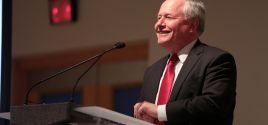Mild In The StreetsPolitics as a Spectator SportBy Ted Rall Jan. 12, 2007 |
Popular 
Bill Kristol: My Fellow White Americans Are 'The Enemy'

Israel Detains American Journalist for Reporting on Damage from Iran's Strikes [UPDATE]

Journalist Jeremy Loffredo Released After Four Days in Israeli Detention, Ordered Not to Leave

Chris Rufo Discovers Who is Flooding The Small Town of Charleroi, Pennsylvania With Haitian Migrants

WATCH: New Film 'Atrocity Inc' Exposes How Israel Lied About October 7th to Justify Genocide
 NEW YORK--Another year in Iraq, another thousand dead soldiers. This grim milestone passed as the wasteful nature of the carnage finally registered with the public; only nine percent of Americans, "dead-enders" in Rumsfeld-speak, still think the war was a wonderful idea. At long last, five years after 9/11, we stand united: Americans want out of Iraq. Not in 18 months, not "peace with honor," not the week after next--now. But representative democracy has failed us. The message voters sent in November was loud and clear: Iraq was a mistake. But our elected representatives, Republicans and Democrats alike, are committed to their quagmire. Republicans, it seems, are trying to vote for the war again before they vote against it. Rather than bring our servicepeople home, Bush wants to "double down" by sending in at least 20,000 more unfortunates to serve as IED fodder. (If the GOP's "surge" idea feels familiar, it ought to: Nixon stepped up the bombing of North Vietnam before the 1972 peace talks in order to improve our hand in negotiations. Rather than soften up the enemy, it hardened their resolve.) Democrats, who won their majority in Congress by attacking the war, are already breaking their promise to put an end to it. Terrified that the right will accuse them of not "supporting the troops" if they cut off funding, they're pledging to keep the billions flowing to Halliburton. Of course, the best way to keep the troops safe is to put them on airplanes that fly them away from the Iraqis who are shooting at them. But that's not about to happen. Unless something changes quickly, 2007 will see the deaths of another thousand American men and women in Iraq. (Not to mention--and the media doesn't--that tens of thousands will suffer terrible injuries. And hundreds of thousands of Iraqis will die in the ethnic cleansing we unleashed by installing a radical Shiite theocracy that masquerades as a government.) How do people in other countries react when their representatives fail to represent them? They march and yell and throw stuff at the police. Some riot. Not here. In the United States in 2007 we sit in front of our TVs and our computer screens and wonder why no one is out there marching and yelling (or rioting). "I'm saddened, baffled and very angry," wrote a reader to the New York Times' editor, "as to why the American people are not demonstrating their frustration and outrage with President Bush's continued failed policies and incompetence...Blogging is great, and calling one's representative is important, but I implore those with national networking and organizational skills to rally us in towns and cities so that our voices will finally be heard." Our kingdom for a leader! Forty years ago, demonstrations against an equivalently unpopular war were routine. Students took over college campuses; marchers filled the streets of our cities. The most radical antiwar activists bombed ROTC and other military offices. Why are we so docile now? There's no disputing Rep. Charles Rangel (news, bio, voting record)'s (D-NY) argument that much of the opposition to the Vietnam War was motivated by the military draft. Self-interest masqueraded as idealism--I could die! Me! Bringing back selective service would force young people to focus on Iraq. Sure, rich parents would pull strings to keep their kids away from the front. But the meat grinder that is Iraq would suddenly pose a threat to the vast middle class, which today remains largely untouched. Volunteer soldiers, drawn disproportionately from the underclass, are politically disposable. Even the left doesn't lose much sleep over these postmodern mercenaries. Hey, they knew the risks when they signed up. The illusionary power of the Internet contributes to our national apathy. When I publish a column describing some outrage, many readers ask me what they can do to. "Who should I e-mail?" "I'll set up a blog!" Yeah. That'll show the bastards! Because I too sometimes receive more e-mail than I can handle, I think I know what happens to e-mails sent to Congressmen: control-A (select all), delete. Calling is slightly more effective; staffers keeps logs of "pro" and "con" phone calls. But shutting down a Congressman's office with a sit-in would make a much stronger impression. Baby Boomers, aging and suffering from demonstration overload by the early 1970s, were followed by my cohort of alienated Gen Xers. We didn't have anything left to give society after struggling to survive broken homes, soaring college debts and shrinking salaries. Yet scattered throughout the history of the 1980s and 1990s are episodes that prove the effectiveness of street activism. Members of ACT-UP staged guerilla actions, such as sneaking onto the set of an evening new broadcast to shame the Reagan Administration for its unwillingness to fund AIDS research. Animal rights activists threw paint on women who wore fur coats; wearing a mink stole has become less publicly acceptable than a bin Laden T-shirt. Anti-globalization protesters brought business at the Seattle confab of the World Trade Organization to a halt, terrorizing the pro-corporatization outfit's delegates merely by breaking a few windows at Starbucks. Why, then, during a universally despised war begun and waged by a president who makes Nixon look like a statesman, aren't Americans running wild in the streets? Because, when the stakes were high and the timing was right, demonstrating didn't seem to have any practical effect. Millions demonstrated in vain against the impending invasion of Iraq in February and March of 2003. Both the turnout and number of cities involved were unprecedented in marches noted for being peaceful. The protests drew many people who had never taken part in such efforts before. But the '03 peace marches were mocked as quaint relics of the 1960s, downplayed or ignored entirely by the media. The war began as scheduled. Why, asked many who had put their faith into peaceful protest, use up a perfectly good Sunday on what is clearly a waste of time? It should be noted that politicians also ignored demonstrations during the heyday of the 20th century protest movement. To be sure, many whites were moved to support equal rights by news accounts of peaceful marches led by the Rev. Martin Luther King, Jr. But many more were shaken by the violent uprisings that set cities from Newark to Watts ablaze after his assassination. The economic costs of the war in Vietnam played at least as much of a role in ending it as the hippies who tried to levitate the Pentagon. In the current era, the 1999 triumph against the WTO was followed by successful gatherings in other cities whose security forces were better prepared. Taking to the streets doesn't always get results--far from it. But it's a lot more likely to work than what we've got now: politics as spectator sport. _________ Ted Rall is the author of "Silk Road to Ruin : Is Central Asia the New Middle East?," an analysis of America's next big foreign policy challenge. Visit his website www.tedrall.com |



